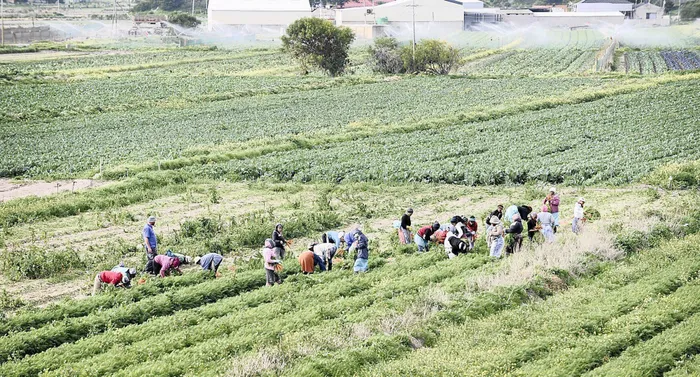Agroecology: A policy imperative for sustainable and resilient food systems in SADC

Agroecology is a holistic, climate-smart, and ecologically sound agricultural system that integrates traditional knowledge with modern science. It promotes diversified farming systems, enhances soil fertility, fosters biodiversity, and builds resilience to climate shocks.
Image: Independent Media
The sustainability and resilience of food systems are at the heart of food security discussions globally, and the Southern African Development Community (SADC) is no exception. The region faces multiple challenges, including climate change, land degradation, water scarcity, and socio-economic vulnerabilities that threaten agricultural productivity and food security. Agroecology has emerged as a key approach to addressing these challenges, offering practical and scientifically grounded solutions to ensure long-term sustainability while enhancing food sovereignty and farmer livelihoods.
Why Agroecology Matters for SADC
Agroecology is a holistic, climate-smart, and ecologically sound agricultural system that integrates traditional knowledge with modern science. It promotes diversified farming systems, enhances soil fertility, fosters biodiversity, and builds resilience to climate shocks. Unlike input-intensive industrial agriculture, which is often associated with environmental degradation and economic vulnerabilities, agroecology aligns with SADC's socio-economic realities and ecological constraints.
The Food and Agriculture Organization (FAO) and other global institutions have recognised agroecology as a viable pathway to sustainable food systems. In a region where more than 70% of the population depends on agriculture for their livelihoods, adopting agroecology can transform food systems by improving yields, restoring degraded ecosystems, reducing dependence on expensive agrochemicals, and strengthening market linkages for smallholder farmers.
The Role of Indigenous Foods in Agroecology
Indigenous foods play a crucial role in advancing agroecological practices in SADC. Traditional crops such as sorghum, millet, cowpeas, and amaranth are naturally adapted to local climatic conditions, requiring fewer external inputs while offering high nutritional value. Promoting the cultivation and consumption of these crops enhances food security, strengthens biodiversity, and reduces reliance on imported staples.
Furthermore, indigenous food systems preserve cultural heritage and empower local communities by maintaining traditional farming knowledge. Policies that support the conservation and commercialisation of indigenous crops can create economic opportunities for smallholder farmers and increase resilience to climate change.
Success Stories in Agroecology Across SADC
Several SADC countries have demonstrated the potential of agroecology in enhancing food security and resilience:
- Zimbabwe: Smallholder farmers practicing agroecology through conservation agriculture and intercropping techniques have improved soil health and increased yields while reducing dependence on chemical fertilizers.
- Malawi: Farmer-managed seed systems promoting indigenous seed varieties have strengthened community resilience by reducing the vulnerability of crops to pests and erratic weather patterns.
- Tanzania: Agroforestry initiatives combining food crops with tree planting have enhanced biodiversity, provided alternative sources of income, and improved soil conservation.
- South Africa: Urban agroecology movements are growing, with small-scale farmers using organic and regenerative farming techniques to supply fresh, nutritious produce to local markets. In addition to urban farming, several rural communities in South Africa have successfully integrated agroecological practices to combat soil degradation and water scarcity. Organisations like the South African Organic Sector Organisation and the African Centre for Biodiversity have been instrumental in promoting seed sovereignty, organic certification, and farmer-led research. The rise of community-supported agriculture initiatives has also connected consumers directly with agroecological farmers, creating a growing market for sustainable food production.
These success stories illustrate the tangible benefits of agroecology and highlight the need for policies that scale up such initiatives across the region.
Policy Recommendations for Scaling Agroecology
- Mainstream Agroecology in National Agricultural Policies SADC member states must integrate agroecological principles into their national agricultural strategies and policy frameworks. This includes incentives for diversified farming, agroforestry, and climate-resilient practices that improve soil health and water retention.
- Enhance Research, Education, and Extension Services. Governments should invest in agroecological research and knowledge-sharing platforms. Agricultural extension services need to shift focus from conventional input-driven methods to participatory, farmer-led knowledge systems that promote ecological farming techniques.
- Develop Supportive Financial Mechanisms. Access to finance remains a major barrier to agroecology adoption. Governments and financial institutions should establish green financing schemes, low-interest credit lines, and insurance products tailored for smallholder farmers transitioning to agroecological practices.
- Strengthen Regional Collaboration and Policy Harmonization. A coordinated regional approach is essential to align policies, facilitate cross-border trade of organic and agroecologically produced goods, and share best practices among SADC nations.
- Promote Market Access for Agroecological Products. Governments and private sector actors should support the development of domestic and export markets for agroecologically produced food. Certification schemes, eco-labelling, and value chain investments can enhance market confidence and ensure premium pricing for sustainable agricultural products.
Conclusion
Agroecology presents a clear opportunity for SADC to transition toward more sustainable, resilient, and equitable food systems. It aligns with the African Union’s Malabo Declaration commitments on food security, climate adaptation, and sustainable agriculture. However, for agroecology to reach its full potential, strong political will, institutional support, and well-designed policies are necessary.
The integration of indigenous foods and the scaling of successful agroecology initiatives offer a pathway to revitalizing the region’s food systems. SADC governments must act now to embed agroecology into their national and regional agricultural development agendas, ensuring food security and economic stability for future generations.

Dr Thulasizwe Mkhabela is an agricultural economist.
Image: Supplied
Dr Thulasizwe Mkhabela is an Honorary Research Fellow with the African Centre for Food Security and the University of KwaZulu-Natal (MkhabelaT1@ukzn.ac.za) and an independent agricultural researcher and policy analyst with extensive experience in South African and African agricultural & development issues. He is also a director and Senior Researcher at Outcome Mapping (www.outcomemapping.co.za; thulasizwe.mkhabela@gmail.com). Dr Mkhabela is also a Food, Agriculture, and Natural Resources Policy Analysis Network associate.
BUSINESS REPORT